Blurry vision can significantly impact daily life, making simple tasks challenging and affecting overall quality of living. While glasses or surgical interventions are standard solutions, many individuals seek natural alternatives to restore clear eyesight.
Understanding the root causes behind blurry vision—including dietary triggers, vitamin deficiencies, lifestyle habits such as excessive screen time and caffeine consumption—is essential for effectively addressing this issue naturally. This article explores practical strategies and natural remedies that empower you to enhance your visual clarity without relying solely on corrective lenses.
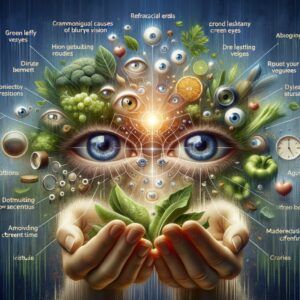
Your future is calling! Answer at Great Life Worldwide and discover why it’s the perfect fit for you. Free tour available – act fast!
1. Common Causes of Blurry Vision You Should Know
Blurry vision is a common visual impairment that can significantly impact daily activities and overall quality of life. Understanding the underlying causes is essential for effectively addressing this issue without relying solely on corrective lenses or surgical interventions.
One prevalent cause of blurry vision is refractive errors, including myopia (nearsightedness), hyperopia (farsightedness), astigmatism, and presbyopia. These conditions occur when the shape of the eye prevents light from focusing accurately onto the retina, resulting in blurred images.
Dry eyes represent another frequent contributor to unclear eyesight. Insufficient tear production or poor-quality tears can lead to irritation and discomfort, causing temporary blurriness that often worsens after prolonged screen time or exposure to dry environments. Additionally, extended periods spent staring at digital screens may trigger computer vision syndrome—a condition characterized by eye strain, headaches, and intermittent blurred vision due to reduced blinking rates.
Certain medical conditions also play a significant role in causing blurry eyesight. Diabetes mellitus can result in diabetic retinopathy—damage to retinal blood vessels, which progressively impairs clear sight if left unmanaged. Hypertension similarly poses risks by damaging delicate ocular structures through elevated intraocular pressure levels or compromised circulation within retinal tissues.
Moreover, age-related macular degeneration (AMD) is an increasingly common cause among older adults, involving the deterioration of central retinal cells responsible for sharp detail perception, which is necessary for reading and recognizing faces. Cataracts—clouding within the lens structure—also commonly develop with the aging process, leading to gradual impairment of clarity over time.
Identifying these diverse factors early allows individuals greater opportunity for intervention using natural methods aimed at improving visual health before more invasive measures become necessary.
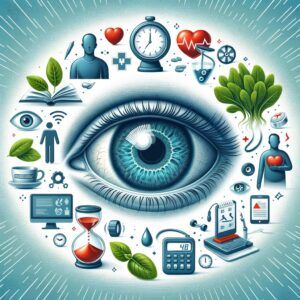
Your future is calling! Answer at Great Life Worldwide and discover why it’s the perfect fit for you. Free tour available – act fast!
2. Foods and Drinks That May Trigger or Improve Blurry Vision
Diet plays a crucial role in maintaining optimal eye health, with certain foods and beverages either exacerbating blurry vision or naturally improving visual clarity. Consuming excessive amounts of sugar-rich foods and drinks can lead to elevated blood glucose levels, potentially causing temporary blurred eyesight due to fluid shifts within the eyes’ lenses. Similarly, high sodium intake from processed snacks or fast food may lead to water retention, which increases intraocular pressure and negatively impacts vision quality.
Conversely, incorporating nutrient-dense foods into your diet can significantly enhance visual acuity. Leafy green vegetables such as spinach and kale are rich sources of lutein and zeaxanthin—antioxidants known for protecting against age-related macular degeneration and improving overall eye function. Omega-3 fatty acids found abundantly in fish like salmon, mackerel, and sardines help reduce inflammation around ocular tissues while supporting retinal health.
Additionally, brightly colored fruits, including oranges, berries, carrots, mangoes, papayas, and other produce containing vitamins A (beta-carotene), C & E, can strengthen eyesight by combating oxidative stress responsible for cellular damage within the eyes. Hydration also remains essential; drinking adequate amounts of water daily ensures proper lubrication of the cornea surface layer, preventing dryness-induced blurriness.
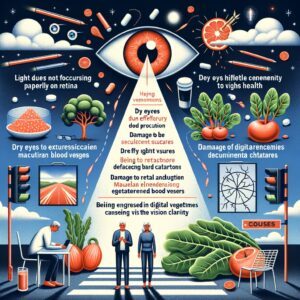
Your success story is a bestseller waiting to happen! Start writing at Great Life Worldwide. Discover how it can be your publisher. Take the free tour today!
3. Vitamin Deficiencies Linked to Blurred Eyesight
Vitamin deficiencies can significantly impact eye health, often manifesting as blurred or compromised vision. One of the most critical vitamins for maintaining clear eyesight is vitamin A, essential for retinal function and night vision. Insufficient intake of vitamin A may lead to difficulties seeing in low-light conditions and an increased risk of dry eyes, which further exacerbates blurry vision.
Another vital nutrient is vitamin B12; deficiency in this vitamin has been associated with optic nerve damage and impaired visual acuity. Individuals experiencing prolonged blurry vision should consider evaluating their dietary intake or supplementing with B-complex vitamins under the guidance of a professional.
Vitamin C also plays a crucial role in ocular health by protecting the eyes against oxidative stress and supporting collagen synthesis within the cornea. A lack of adequate vitamin C can weaken corneal integrity, leading to distorted or unclear vision over time.
Additionally, insufficient levels of vitamin E have been linked to progressive deterioration in visual clarity due to its antioxidant properties that protect eye cells from free radical damage. Ensuring proper consumption through diet or supplementation helps maintain healthy retinal tissues and prevents age-related macular degeneration (AMD), a common cause of blurred central vision among older adults.
Lastly, deficiencies in minerals such as zinc may indirectly contribute to poor eyesight by impairing the absorption and utilization of other essential nutrients necessary for optimal ocular function. Zinc supports overall retinal metabolism; thus, inadequate levels could negatively affect visual sharpness.
Addressing these nutritional gaps through a balanced diet rich in colorful fruits, vegetables, nuts, seeds, whole grains, lean proteins, or targeted supplementation can effectively improve blurred eyesight naturally, without relying solely on corrective lenses.
4. Natural Remedies and Supplements for Restoring Clear Vision
Several natural remedies and supplements have demonstrated effectiveness in supporting clearer vision without the need for corrective lenses. Bilberry extract, derived from a fruit closely related to blueberries, is renowned for its high antioxidant content, particularly anthocyanins. These antioxidants help strengthen retinal tissues and improve circulation within the eyes, thereby enhancing visual clarity and reducing eye fatigue.
Omega-3 fatty acids are another essential supplement beneficial to eye health. Found abundantly in fish oil or flaxseed oil supplements, omega-3s support healthy retinal function by maintaining proper moisture levels in the eyes and reducing inflammation that can lead to blurry vision or discomfort.
Lutein and zeaxanthin are carotenoid compounds naturally present in leafy green vegetables such as spinach or kale; however, supplementation may be necessary if dietary intake is insufficient. These nutrients accumulate directly within the retina’s macula region, where they protect against oxidative stress caused by exposure to blue light from digital screens or sunlight, thereby preserving the sharpness of central vision.
Eyebright (Euphrasia officinalis), an herbal remedy traditionally used for centuries to treat various eye conditions, including irritation, redness, dryness, and blurred sight issues due to strain or allergies, is also gaining recognition among modern practitioners as a gentle yet effective option when taken orally or applied topically through eyewashes.
Finally, Ginkgo biloba has shown promise in enhancing ocular blood flow while providing potent antioxidant protection against free radical damage associated with age-related decline in visual acuity. Regular use of these natural remedies, combined with a balanced diet, can significantly contribute to restoring clear eyesight naturally over time, without relying solely on prescription glasses.
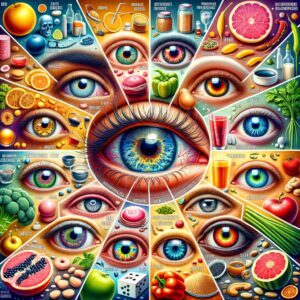
Your Health Journey Deserves the Best—Choose GreatLife Quality.
5. How Lifestyle Habits Like Phone Use and Coffee Consumption Affect Your Eyesight
In today’s digitally driven world, prolonged use of smartphones and other electronic devices has a significant impact on visual health. Continuous exposure to screens often leads to digital eye strain, characterized by symptoms such as blurred vision, dry eyes, headaches, and difficulty focusing.
The blue light emitted from these devices penetrates deeply into the retina, potentially causing long-term damage and exacerbating existing vision problems. Additionally, staring at screens for extended periods reduces blinking frequency, which can lead to dry eyes and further contribute to blurry vision.
Similarly, regular coffee consumption is also impactful; while moderate caffeine intake may temporarily enhance alertness and cognitive function, excessive amounts can hurt ocular health. High caffeine levels have been linked with increased intraocular pressure (IOP), a critical risk factor in developing glaucoma, a condition known for causing progressive vision loss if left untreated. Furthermore, caffeine acts as a diuretic, which can lead to dehydration. Insufficient hydration can adversely affect tear production, leading to dry eyes and impaired vision clarity.
Adopting healthier lifestyle habits can significantly mitigate the adverse effects on eyesight. Limiting screen time or taking frequent breaks using the 20-20-20 rule—looking away every 20 minutes at something 20 feet away for at least 20 seconds—can help alleviate digital eye strain effectively.
Reducing daily coffee intake or substituting caffeinated beverages with water-rich alternatives helps maintain proper hydration levels, which are essential for maintaining optimal ocular lubrication and clear vision.
By consciously adjusting everyday behaviors related to phone usage patterns and dietary choices involving caffeine consumption, individuals can naturally safeguard their visual acuity without relying solely on corrective lenses or medical interventions.
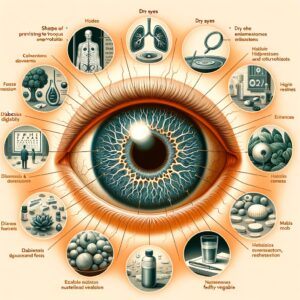
Achieve Your Wellness Goals with Expert-Backed Nutrition.
6. Recognizing Serious Health Red Flags Behind Persistent Blurry Vision
Persistent blurry vision can sometimes indicate underlying health conditions that require immediate medical attention. While occasional blurred eyesight may be harmless, ongoing or worsening symptoms could signal serious issues such as diabetes, hypertension, or neurological disorders.
Diabetes-related eye complications, including diabetic retinopathy, often manifest initially through fluctuating vision clarity and blurriness due to elevated blood sugar levels damaging retinal blood vessels. Similarly, high blood pressure can lead to hypertensive retinopathy, characterized by blurred vision and potential damage to the retina if left untreated.
Neurological conditions also pose significant risks, including persistent visual disturbances. Conditions like multiple sclerosis (MS) frequently present early signs of optic neuritis—a condition causing inflammation of the optic nerve, resulting in sudden blurry or dimmed vision accompanied by pain during eye movement. Additionally, stroke events may cause abrupt changes in eyesight clarity alongside other neurological symptoms such as dizziness or numbness on one side of the body.
Furthermore, glaucoma—a progressive disease characterized by increased intraocular pressure—can gradually impair peripheral vision before eventually affecting central sight if not diagnosed promptly. Cataracts are another common yet serious cause of chronic blurry eyesight; they involve the clouding of the lens within the eye, leading progressively to impaired visual acuity.
Recognizing these red flags is crucial for timely intervention and treatment to prevent irreversible damage or permanent loss of sight. Individuals experiencing persistent blurry vision should seek a professional evaluation from an ophthalmologist immediately, rather than attributing their symptoms solely to fatigue or the aging process. Early detection significantly improves prognosis and preserves long-term ocular health effectively.
7. Practical Tips to Reset Your Eyesight Naturally After Waking Up
Upon waking, your eyes may feel strained or blurry due to overnight dryness or prolonged closure. To reset your eyesight naturally and enhance visual clarity in the morning, begin by gently massaging the area around your eyes using circular motions with clean fingertips. This practice stimulates blood circulation and relaxes tense eye muscles, promoting clearer vision.
Next, perform simple eye exercises, such as deliberately blinking for 30 seconds, to replenish moisture levels on the ocular surface. Blinking helps lubricate dry eyes that commonly occur after sleep, reducing irritation and improving focus quickly. Additionally, practicing palming—covering closed eyelids lightly with warm palms for one minute—can significantly reduce tension accumulated overnight.
Hydration also plays a crucial role in resetting eyesight upon awakening. Drinking a glass of water immediately after rising can help rehydrate tissues throughout the body, including those within the eyes, and alleviate early-morning blurriness caused by dehydration.
Exposure to natural daylight shortly after waking is another effective way to recalibrate your vision naturally. Briefly stepping outside or positioning yourself near an open window allows sunlight exposure that supports healthy circadian rhythms essential for optimal visual function throughout the day.
Lastly, avoid using screens immediately upon awakening, as digital devices emit blue light that can further strain sensitive morning vision. Instead, spend at least ten minutes engaging in distance viewing activities, such as looking out into nature or across a room. This encourages proper focusing mechanisms within your eyes and sets them up effectively for clear sight during daily tasks ahead.

Nourish Your Body, Fuel Your Potential—Start with GreatLife Supplements.
Conclusion:
Achieving a clearer vision naturally isn’t only possible but also sustainable through informed lifestyle choices and proactive self-care practices. By recognizing underlying health issues early, adjusting dietary habits, supplementing key nutrients like vitamins A, B12, C, E and zinc—and incorporating beneficial supplements such as bilberry extract or omega-3 fatty acids—you can significantly improve your eyesight over time.
Additionally, adopting healthier screen usage patterns, along with morning routines specifically designed to reset ocular function, will further support long-term optimal eye health. Embracing these holistic approaches enables you to maintain sharp visual acuity while reducing your dependence on traditional corrective measures, such as glasses or surgery, ultimately leading to a more vibrant life enriched by clear sight every day.

